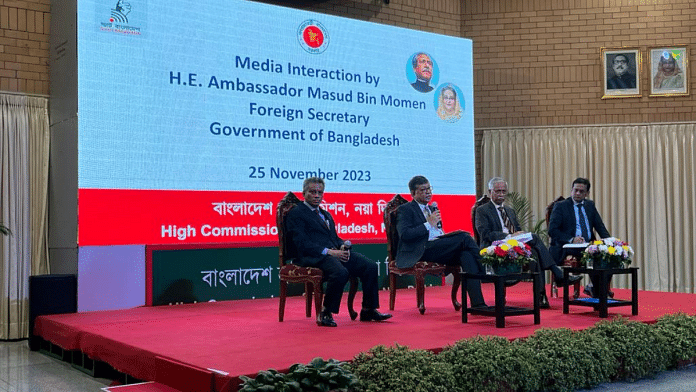New Delhi: Bangladesh has invited countries to send observers ahead of its upcoming elections, its foreign secretary Masud Bin Momen said while speaking to reporters in New Delhi Saturday. The remarks come amid mounting Western concerns about democratic processes in the South Asian country.
“I met the heads of missions in Delhi to brief them about political developments (in Bangladesh) and invited them to visit Bangladesh before the elections,” Momen said a day after holding consultations with his Indian counterpart Vinay Kwatra. The two discussed bilateral cooperation in energy, trade, and connectivity among other things at the Hyderabad House in New Delhi Friday.
The remarks came on the back of allegations of a crackdown on the critics of Prime Minister Sheikh Hasina, who is looking to secure a sixth term in the 7 January, 2024 election. Critics of Hasina’s ruling Awami League — including the opposition Bangladesh Nationalist Party — accuse the prime minister and her party of arresting and jailing opposition leaders in an attempt to rig the elections.
In April, Hasina accused the US of attempting a regime change in Bangladesh. Five months later, the US announced visa restrictions on individuals “involved in undermining the democratic election process in Bangladesh”.
Meanwhile, as street protests against the Hasina regime grow, opposition parties such as the BNP are expected to boycott the polls.
Asked about Western concerns about the alleged democratic backsliding in Bangladesh, the foreign secretary said no country likes “interference in its domestic affairs” and others may have their own “prism” by which they view developments in another country.
“Some political parties have been involved in the destruction of public property, cars, railways as well as an attack on the Chief Justice’s residence,” Momen said.
In late October, opposition leader and BNP secretary general Mirza Fakhrul Islam Alamgir was detained during violent anti-government protests in Dhaka, including an alleged attack on the home of Bangladesh’s chief justice. One police officer was also killed during the protests.
Previous elections in Bangladesh also faced turmoil. In 2014, opposition parties boycotted the polls, and in 2018, the ruling party faced allegations of rigging elections.
Also Read: BNP, Jamaat-e-Islami violence won’t decide Bangladesh election results—the ballot box will
‘India has made its position quite clear’
Asked about India’s response to Western concerns over the upcoming elections in Bangladesh, the foreign secretary said New Delhi had made its position “quite clear” after the recently held 2+2 meetings with the US.
“India has already made its position quite clear…especially after the 2+2 meetings. We are an open country. We are committed to our own democratic processes,” Momen told journalists.
Foreign and defence ministers of India and the US held dialogues on 10 November, and a similar format was held with officials from Australia on 20 November.
During the first dialogue with the US, India made it clear that it supports the democratic processes in Bangladesh.
“We shared our perspective (with the US) very, very clearly. It is not our space to comment on a policy of a third country. When it comes to developments in Bangladesh, elections in Bangladesh, it’s their domestic matter,” Kwatra told journalists in a briefing after the meeting.
He added that India “as a close friend and partner of Bangladesh, respects the democratic processes there and will continue to support that country’s vision for a stable, peaceful and progressive nation that the people of that country seek for themselves”.
India-Nepal-Bangladesh power-sharing transmission line
During the consultations Friday, India and Bangladesh discussed the first-of-its-kind tripartite power-sharing agreement between India, Nepal and Bangladesh in which Nepal seeks to export hydropower to Bangladesh via a cross-transmission line in India.
The Bangladesh foreign secretary said the capacity of the current transmission line is only 40MW and a new line would take almost two years to build.
“40MW (is being transmitted) at the moment. India has been generous enough to keep that option open for private sector entities,” he told journalists.
The bigger issue, he said, is to have more capacity in the transmission lines.
“Nepal has a huge capacity potential. Bhutan also. In the future, if 500 or 600 MW is made available for us to use or purchase, then we don’t have that transmission line. To build a transmission line, my counterpart Mr Kwatra mentioned that it can take up to 23 months. You need land acquisition, development work, and other aspects,” he told reporters.
(Edited by Uttara Ramaswamy)
Also Read: How Sheikh Hasina’s breaking the Chinese wall, creating new links between India — and India



